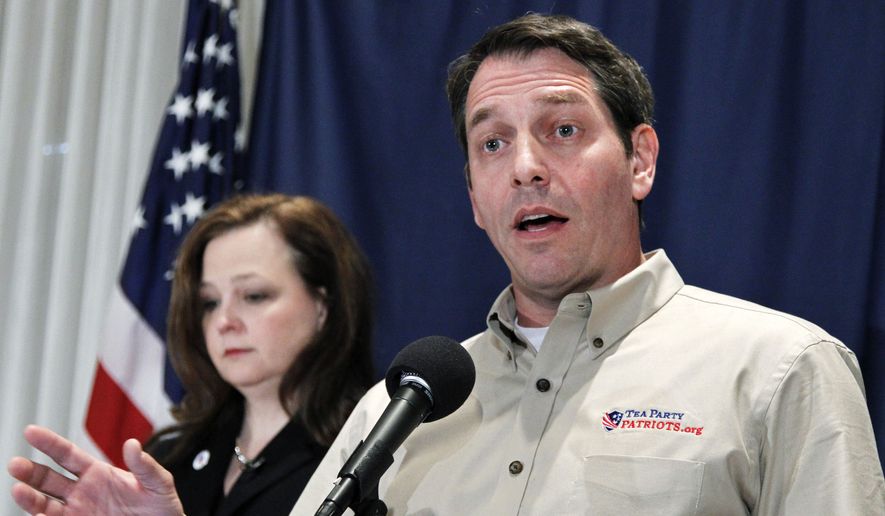Conservative activists pushing to amend the Constitution to rein in federal spending are preparing to delve into state legislative elections across the country, specifically targeting Republicans who are standing in the way of a convention of the states.
“Our attitude is if state legislators won’t stand against Washington, D.C., then they need to be replaced by somebody who will,” Mark Meckler, president of Citizens for Self-Governance and a leader of the state convention movement, told The Washington Times in an interview this week.
Mr. Meckler already has one target in mind: Virginia State Sen. Richard H. Black, a Loudoun County Republican who helped derail an effort in Richmond earlier this year to add Virginia’s voice to the states seeking a convention to rein in federal spending.
“My personal opinion is, and the plan’s not in place, but my personal opinion is — got to remove him from office,” Mr. Meckler said. “He’s irrational on the issue, he’s unreasonable, he’s outrageous.”
Mr. Meckler, a co-founder of the Tea Party Patriots, is part of the growing movement among conservatives to have the states exercise their right under the Constitution’s Article V to call a constitutional convention to consider amendments. If two-thirds of the states’ legislatures issue a call, the federal government is compelled to organize the convention.
The effort has raised plenty of questions, including thorny legal issues over when enough states have issued a convention call and whether a convention can be limited to a single idea, such as a balanced budget amendment.
SEE ALSO: Virginia resolution to enjoin constitutional convention fizzles
Mr. Black said he opposed a convention call because he fears such a gathering, without a more defined process for selecting delegates, could be hijacked by its liberal opponents.
“The odds of winning the game are pretty good, but the consequences of being [wrong] are profound,” he said. “It is remarkable that people who claim to be so [dedicated] to the Constitution are willing to roll the dice and create a totally unknown form of government and basically do away with the Constitution.”
He led opposition this year to passing a convention call through Virginia’s General Assembly, where separate measures calling for a convention for the purposes of reining in the federal government and for a balanced budget advanced to the floor of the state House and Senate.
But state Sen. Ryan T. McDougle, Hanover Republican, and Delegate L. Scott Lingamfelter, Prince William Republican, ended up nixing their own bills, which were supported by Mr. Meckler’s group, for lack of support.
Other applications calling for a convention for the purposes of a balanced budget amendment also died.
Republicans have a sizable advantage in the House, but hold only a 21-19 edge in the Senate, meaning Democrats can effectively block a majority if one Republican defects.
Mr. Meckler said he considered Mr. Black the major impediment in Virginia, though an immediate bid to oust the senator could be an uphill climb. The Republican became his party’s nominee for the fall election after no other candidates filed before a deadline last month.
Others could be targeted as well, Mr. Meckler said.
A number of conservative leaders have been pushing for a convention, with varying degrees of success. Such conservative luminaries as Mark Levin and Sean Hannity have helped catapult the idea on the national stage,
Utah, North Dakota and South Dakota passed applications this year on a balanced budget amendment, and advocates have targeted a handful of other states.
It takes 34 states to issue a call, and by some counts Michigan met that threshold when it approved a convention call last year. Some scholars, though, say states that have rescinded their applications, which applies to about a dozen of them, should not count.
Congressional Republicans tried earlier this decade to add a balanced budget amendment through the more traditional route of having both chambers of Congress pass a resolution by a two-thirds vote, but the measure didn’t clear either chamber.
In the 1990s, such a proposal did clear the House and came within a single vote of clearing the Senate, but a Republican who previously supported the amendment doomed it by voting against it.
Mr. Meckler said he would judge progress based on the number of states where a convention call is introduced, which he said has been a good test for grass-roots organizing.
He said that is an important step forward from where the tea party was a few years back.
“The most important thing we’re doing is building a powerful grass-roots army infrastructure,” he said. “I’m a tea party guy through and through. Where the tea party movement didn’t achieve its objective is it never had hard and fast goals. It didn’t actually have a plan.”
• David Sherfinski can be reached at dsherfinski@washingtontimes.com.




Please read our comment policy before commenting.